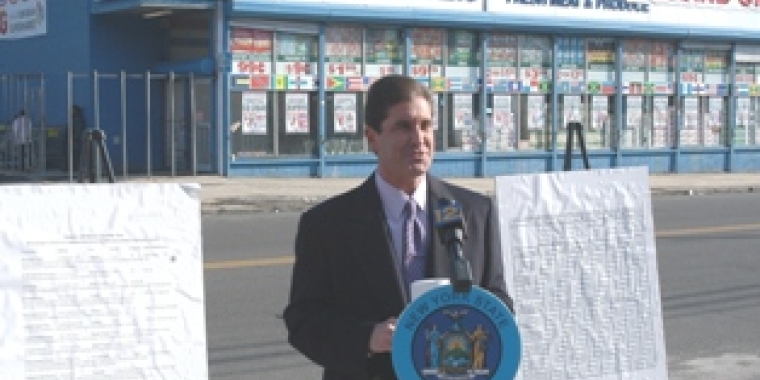
New Klein Report Cites Continuing Pest Problems At Metropolitan Area Supermarkets And Names Westchester’s Most “terrible Ten” Based On 2005 State Inspections
Jeffrey D. Klein
December 18, 2005

County and assesses the impact of legislation Klein authored and passed in 2000 strengthening inspection requirements for retail food stores statewide.
Bronx supermarkets were the worst offenders, with inspectors giving failing marks for insect, rodent, bird and vermin activity near food (critical violation 4F) more than 26% of the time. Even stores with passing grades are harboring pests. In Brooklyn, more than a third of supermarket inspections cited evidence of rodent activity (general violation 14A) somewhere on the premises and 43% observed insects, birds or other vermin (general violation 14B) in the establishment.
New York enacted my law, which imposed strict new rules for supermarket inspections, there are still some supermarkets that are not keeping their establishments in a sanitary manner by allowing disease-carrying pests to contaminate our food supply.”
County, based on Klein’s analysis of 2005 inspection data. The supermarkets on the “Terrible Ten” list were chosen by examining the actual inspection reports issued to failing supermarkets detailing unsanitary conditions, rodent and insect activity and any other deficiencies.
Westchester’s supermarkets had failed their most recent inspection, but the vast majority managed to clean up their acts upon re-inspection. On a positive note, only one supermarket in the county was cited for failure to post its inspection results.
New York City supermarkets, the Supermarket Safety Law requires state inspectors to visit every retail food store in the state at least annually. Supermarkets with multiple failures get biannual inspections and an educational compliance session with a food safety expert from the Department of Agriculture and Markets. The law also empowers consumers to better monitor their local grocers by requiring supermarkets and retail food stores statewide to post the date and results of their most recent state inspections.
In an effort to reduce levels of supermarket pest activity that remain dangerously high, Senator Klein has also introduced new legislation, Senate Bill 3298, that would expand upon the reforms he made in 2000. Specifically, his latest bill would take the existing “three strikes” rule and make it mandatory. Under the current rules, the state has the option of moving to revoke a supermarket’s license after three consecutive inspection failures, but often waits much longer.
State will tolerate unsafe conditions in our supermarkets.”
Klein’s new bill would also strengthen the supermarket posting requirement by imposing a fine of $500 on stores that do not comply. Currently, failure to post is cited as a general deficiency in a store’s inspection report but does not incur any other penalty, even for repeat offenders. A general deficiency is a violation that does not directly endanger the food supply so is not serious enough to trigger a failing grade. After a rocky start in 2001, most supermarkets in the state are following the posting requirement, but Klein is eager to avoid a return to chaotic conditions only three years ago when the statewide non-compliance rate was more than 20%.
30 – 30 – 30
Share this Article or Press Release
Newsroom
Go to Newsroom
Senate Passes Klein Bill to Crack Down on Auto Insurance Fraud
January 31, 2012